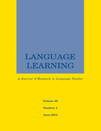
LANGUAGE LEARNING
Scope & Guideline
Elevating discourse in linguistics and education.
Introduction
Aims and Scopes
- Applied Linguistics Research:
Focuses on the intersection of language learning and linguistics, providing insights into how language functions in educational contexts. - Academic Literacy Development:
Explores methods and frameworks for enhancing students' academic writing and literacy skills across various disciplines. - Integration of Technology in Language Learning:
Investigates the role of digital tools and AI technologies, such as ChatGPT, in supporting language learning and academic integrity. - Intercultural Communication and Competence:
Emphasizes the importance of intercultural skills in language education, particularly in the context of international students. - Educational Policies and Practices:
Analyzes institutional responses and frameworks that support language learning and academic literacy in higher education.
Trending and Emerging
- Impact of AI on Education:
The exploration of AI technologies, particularly generative AI like ChatGPT, is gaining traction, focusing on its implications for academic integrity, writing, and learning processes. - Embedding Academic Support:
There is a growing emphasis on integrating academic support services directly into curricula to enhance students' academic literacy and success. - Distance and Online Learning:
Research on distance education and online learning environments has surged, particularly in the context of the COVID-19 pandemic, highlighting new pedagogical strategies and student experiences. - Student-Centered Approaches:
A trend towards more student-centered pedagogies is emerging, focusing on students' perspectives and experiences in language learning. - Interdisciplinary Approaches to Language Learning:
There is an increasing interest in interdisciplinary frameworks that combine language learning with other fields, such as medical education and intercultural studies.
Declining or Waning
- Traditional Language Teaching Methodologies:
There has been a noticeable decrease in publications focusing on conventional language teaching methodologies, possibly due to a growing emphasis on innovative and technology-driven approaches. - Purely Theoretical Linguistics:
Research that purely discusses theoretical frameworks without practical application in language education appears to be less prevalent, reflecting a trend towards applied research. - General Language Acquisition Studies:
Studies centered on broad language acquisition theories are waning, as the journal shifts towards more specific contexts such as academic literacy and technology integration.
Similar Journals

Journal of Research in Applied Linguistics
Innovating Language Studies for TomorrowJournal of Research in Applied Linguistics is an esteemed academic journal published by Shahid Chamran University Ahvaz, Iran, focusing on the dynamic field of linguistics and language studies. With an ISSN of 2345-3303 and an E-ISSN of 2588-3887, the journal has established itself as a valuable resource for researchers and professionals aiming to explore diverse issues related to applied linguistics, including language acquisition, pedagogy, and sociolinguistic interactions. As part of a robust academic community since its inception in 2017, it is recognized with a Q2 quartile ranking in the world of linguistics and achieved impressive Scopus ranks reflective of its growing impact, particularly within the arts and humanities. The journal embraces an open access policy, enhancing its reach and availability to a broad audience. Researchers, educators, and students alike will find in the Journal of Research in Applied Linguistics a critical platform for dialogue, innovation, and contribution to the evolving landscape of language research.
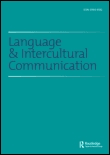
Language and Intercultural Communication
Transforming Communication Through Cultural AwarenessLanguage and Intercultural Communication is a leading peer-reviewed journal published by Routledge Journals, Taylor & Francis Ltd, based in the United Kingdom. With an ISSN of 1470-8477 and an E-ISSN of 1747-759X, this esteemed publication has established itself as a vital resource in the fields of Communication and Linguistics, boasting an impressive Q1 classification in both categories as of 2023. The journal's scope encompasses a broad range of topics related to language and its role in intercultural contexts, making it an essential platform for researchers, professionals, and students alike who wish to contribute to and learn from the latest scholarly discussions. Even without an open-access option, its high impact factor and strong Scopus rankings, which place it in the 87th percentile for Linguistics and Language, affirm its significance in shaping contemporary dialogue. As we move towards 2024, Language and Intercultural Communication continues to foster academic exchanges that challenge, expand, and enrich understanding across diverse linguistic and cultural landscapes, making it a must-read for anyone interested in the intersection of language and culture.

Iberica
Exploring the frontiers of language and communication.Iberica, an esteemed journal published by AELFE, serves as a vital platform for scholarly discourse in the fields of linguistics and language studies. With its inception as an Open Access publication in 1999, Iberica has democratized access to high-quality research, fostering an environment of collaboration and innovation among researchers and professionals alike. Based in Spain at UNIV JAUME I, the journal has witnessed a remarkable ascent in the 2023 category quartiles, achieving a Q1 ranking in Linguistics and Language. Furthermore, its impressive Scopus rankings place it in the top 25% within both the Arts and Humanities and Social Sciences disciplines. Covering a diverse range of topics from theoretical linguistics to applied language studies, Iberica offers a compelling opportunity for academics seeking to contribute to and engage with contemporary issues in the linguistic landscape. As it converges in its publishing years from 2008 to 2024, it continues to set the standard for excellence within its field, making it an essential resource for students, researchers, and language professionals.

Argentinian Journal of Applied Linguistics
Advancing practical linguistics for a transformative educational experience.The Argentinian Journal of Applied Linguistics is a prominent publication dedicated to advancing the field of linguistics with a particular focus on practical applications within various contexts. Published by the Federación Argentina de Asociaciones Profesionales de Profesores de Inglés (FAAP), this journal serves as a vital platform for researchers, educators, and linguistics professionals interested in the nuances of language teaching, acquisition, and sociolinguistics. With an ISSN of 2314-3576, the journal showcases original research and reviews that push the boundaries of current knowledge and practice in applied linguistics. Despite being in its early stages, the journal aims to build a strong academic presence by fostering collaboration among scholars and practitioners, thereby contributing to the enhancement of language education in Argentina and beyond. The importance of this journal lies not only in its commitment to accessibility and knowledge dissemination but also in its role as a bridge between linguistic theory and practical application, ultimately benefiting educators and learners alike.
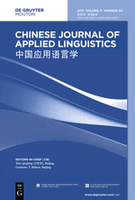
Chinese Journal of Applied Linguistics
Connecting scholars and practitioners in linguistics.The Chinese Journal of Applied Linguistics, published by the esteemed FOREIGN LANGUAGE TEACHING & RESEARCH PRESS, serves as a premier platform for scholars and practitioners in the field of linguistics, specifically focusing on the application of linguistic research in real-world contexts. With an ISSN of 2192-9505 and an E-ISSN of 2192-9513, this journal is distinguished by its position in the Q1 category for Linguistics and Language as of 2023, underscoring its influence and prestige within the academic community. Notably, it ranks 248th out of 1,088 in the Arts and Humanities field and 292nd out of 1,167 in Social Sciences, reflecting a strong percentile rank of 77th and 74th respectively. This journal aims to contribute to the advancement of applied linguistics through innovative research articles, comprehensive reviews, and critical discussions on contemporary issues in language learning and teaching, thereby attracting a diverse readership of researchers, educators, and students who are keen on exploring new linguistic paradigms. With its scope spanning from 2017 to 2024, the Chinese Journal of Applied Linguistics is committed to disseminating cutting-edge insights and fostering dialogues that propel the discipline forward, making it an essential resource for anyone engaged in the study of language and its applications.

Porta Linguarum
Fostering dialogue in the dynamic world of linguistics.Porta Linguarum, published by UNIV GRANADA in Spain, is a pioneering journal dedicated to the fields of linguistics and language studies, with a dual focus on the educational implications and applications within these disciplines. Launched in 2008 and continuing its impactful contributions into 2024, the journal is recognized for its rigorous peer-reviewed articles that address contemporary language issues, pedagogical approaches, and linguistic research, evidenced by its notable rankings in the 2023 Scopus metrics. Porta Linguarum holds a distinguished Q1 classification in Linguistics and Language, alongside a respectable Q3 placement in Education, marking it as a valuable resource for academics and practitioners alike. With an impressive ranking of 231 out of 1088 in the Arts and Humanities category and a strong 78th percentile ranking for Language and Linguistics, this journal facilitates the exchange of innovative ideas and promotes scholarly discourse. Although currently not adopting an open access model, it remains an essential platform for advancing knowledge in linguistics and education.
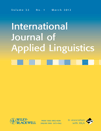
International Journal of Applied Linguistics
Bridging Gaps Between Linguistic Theory and Real-World ApplicationsInternational Journal of Applied Linguistics, published by WILEY, is a premier platform for cutting-edge research in the field of applied linguistics. With a notable Impact Factor and ranked in the top Q1 quartile of linguistics and language, this journal serves as an essential resource for scholars, practitioners, and students. The journal’s wide-ranging scope includes various subfields such as language acquisition, language education, sociolinguistics, and discourse analysis, fostering multidisciplinary approaches to language studies. It has achieved a significant Scopus Rank, placing it in the 90th percentile for both Arts and Humanities as well as Social Sciences categories, reflecting its high visibility and influence in the academic community. The International Journal of Applied Linguistics is committed to advancing the understanding of language use in real-world contexts through rigorously peer-reviewed articles that contribute to both theory and practical applications. While it is not an open-access journal, it remains a highly respected publication for researchers looking to disseminate and acquire knowledge in applied linguistics.

Language Learning in Higher Education
Transforming higher education through effective language learning.Language Learning in Higher Education is a prominent academic journal published by DE GRUYTER MOUTON, dedicated to exploring the intricate dynamics of language acquisition and pedagogical practices within the higher education context. With a robust ISSN: 2191-611X and E-ISSN: 2191-6128, this journal provides a platform for innovative research that addresses contemporary challenges and methodologies in language education. The journal enjoys a favorable reputation in the academic community, as evidenced by its ranks in the Scopus database, where it holds a position in the 67th percentile for Language and Linguistics and is classified in the Q3 and Q2 quartiles across relevant education and linguistics categories. Since its convergence in 2017, Language Learning in Higher Education aims to enrich scholarly discourse by publishing high-quality articles that foster insights into effective language learning strategies, thus serving as an essential resource for researchers, educators, and students committed to enhancing language education. The journal's editorial team is devoted to advancing the field through rigorous peer-review processes and welcomes contributions that push the boundaries of language learning research.

Journal of Academic Language and Learning
Unlocking the complexities of language in academia.Journal of Academic Language and Learning is an esteemed publication dedicated to the exploration and analysis of language use in academic contexts, particularly focused on promoting pedagogical practices and research methodologies that enhance learning outcomes. Published by ASSOC ACAD LANGUAGE LEARNING, this journal serves as a vital resource for educators, researchers, and students seeking to understand the complexities of academic language development. With its strong emphasis on accessibility and engagement, the journal publishes high-quality research that bridges theory and practice, facilitating dialogue among professionals in the field. The journal's comprehensive scope includes topics such as language acquisition, literacy practices, and assessment strategies, making it an integral platform for those committed to advancing academic language learning. While specific impact factors and access options are currently unavailable, its commitment to open discourse ensures that significant contributions to the field are actively shared and disseminated. The Journal of Academic Language and Learning is poised to impact language learning methodologies, equipping its readership with the insights necessary for fostering academic excellence.
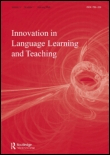
Innovation in Language Learning and Teaching
Catalyzing Change in Language Acquisition and Teaching Methodologies.Innovation in Language Learning and Teaching is a premier peer-reviewed journal published by Routledge Journals, Taylor & Francis Ltd, focusing on the intersection of innovative practices in language education and teaching methodologies. With a notable impact factor reflected in its recent placement in the Q1 quartile for both Education and Linguistics and Language categories, this journal serves as a crucial resource for scholars and practitioners aiming to enhance pedagogical approaches and improve learning outcomes in language education. Spanning from 2009 to 2024, it showcases cutting-edge research that addresses contemporary challenges in the field, facilitating a deeper understanding of language acquisition, pedagogy, and curriculum development. The journal is indexed in Scopus, demonstrating its significant contribution to the academic community, with impressive ranks in both the Arts and Humanities as well as the Social Sciences categories. Although it follows a traditional subscription model, the journal is committed to disseminating high-quality research that fosters collaboration and discussion among researchers, educators, and students dedicated to advancing language learning and teaching practices.